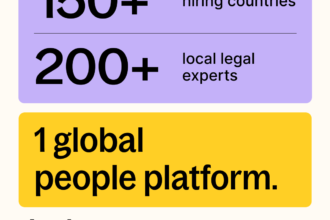As businesses expand internationally, managing payroll across multiple countries becomes a significant challenge. Differences in local tax laws, employment regulations, payroll structures, and compliance requirements make it difficult for companies to manage payroll efficiently.
Global payroll solutions provide businesses with a centralized, compliant, and scalable way to manage employee payments across borders. In this blog, we will explore why global payroll solutions are critical for international business expansion and how they help organizations streamline operations, reduce compliance risks, and improve employee satisfaction.
1. Simplifying Multi-Country Payroll Management
Each country has unique payroll regulations, tax structures, and reporting requirements. A global payroll solution automates calculations, deductions, and tax filings, ensuring accuracy and compliance across multiple jurisdictions. This eliminates manual errors and administrative burdens, allowing businesses to focus on growth.
2. Ensuring Compliance with Local Regulations
Expanding internationally requires adherence to local labor laws, tax policies, and statutory benefits. Non-compliance can result in penalties, legal disputes, or even business restrictions. Global payroll providers have in-depth knowledge of local compliance requirements, ensuring payroll is processed according to each country’s regulations.
3. Managing Currency and Payment Complexities
Paying employees in different currencies while dealing with exchange rate fluctuations and banking regulations can be complex. A global payroll solution automates currency conversions and ensures that employees receive their salaries on time in their local currency.
4. Improving Employee Experience and Retention
A smooth and error-free payroll process boosts employee satisfaction. When employees receive their salaries on time, with correct tax deductions and benefits, they trust their employer and remain engaged. Global payroll solutions provide employees with self-service portals to access payslips, tax documents, and benefits, improving transparency.
5. Reducing Operational Costs and Administrative Burdens
Managing payroll in-house for multiple countries can be costly and time-consuming. By leveraging a global payroll provider, businesses reduce HR workload, minimize payroll errors, and eliminate the need for multiple local payroll teams.
6. Gaining Real-Time Payroll Insights
A centralized payroll system provides real-time reporting and analytics on employee costs, tax liabilities, and workforce distribution. These insights help businesses make strategic financial and workforce planning decisions.
7. Supporting Business Scalability
As businesses expand into new markets, hiring employees quickly and compliantly is essential. A global payroll provider allows companies to onboard employees faster, handle multi-country payroll, and scale without setting up local entities.
Conclusion
Global payroll solutions are essential for businesses looking to expand internationally. They ensure compliance, efficiency, accuracy, and employee satisfaction while reducing operational complexities. Whether a company is hiring in one country or across multiple regions, a centralized payroll system provides the necessary tools to manage global operations smoothly.






